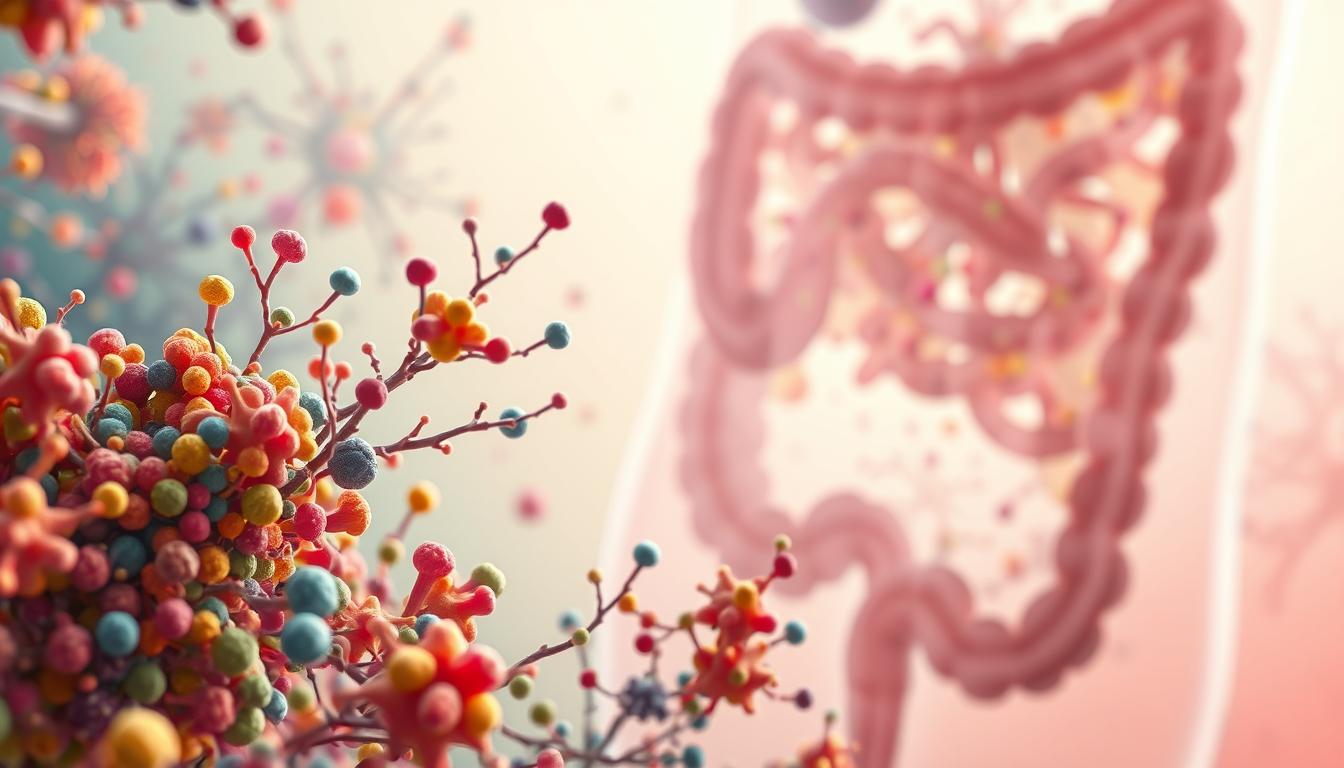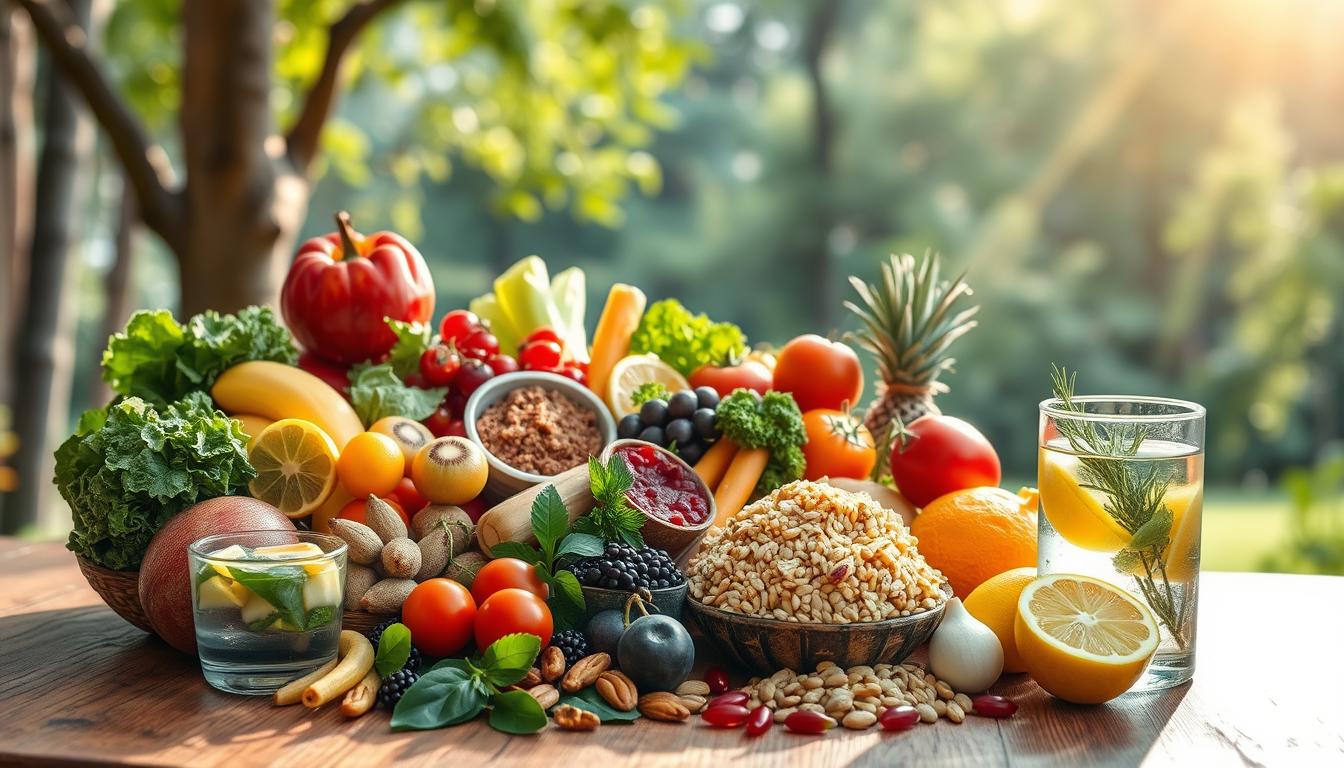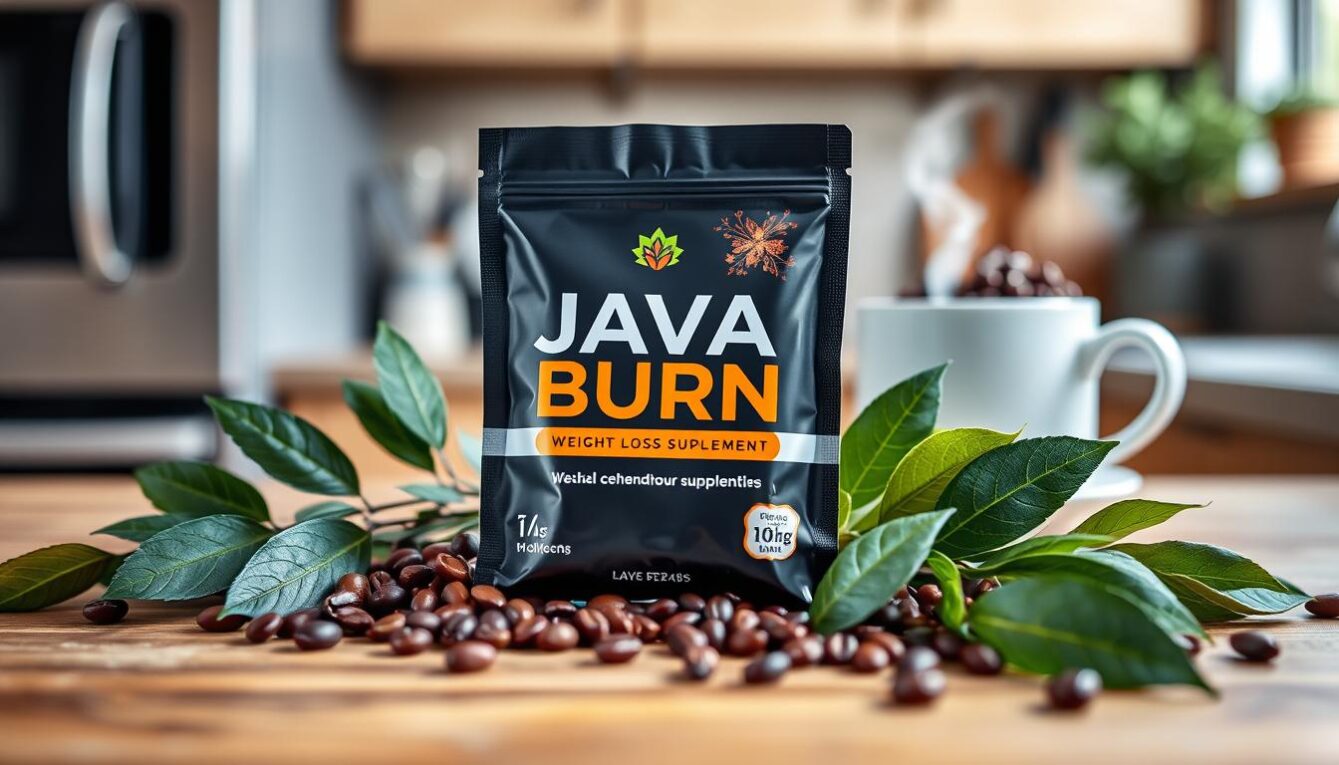Ever feel sluggish after meals or struggle with digestion? Your gut microbiome—home to trillions of microbes—might need attention. Research shows these tiny organisms influence everything from immunity to mood. A balanced microbiome can mean better energy and fewer health issues.
Studies like ZOE’s reveal that diverse gut bacteria lower disease risks and improve metabolism. Dr. Will Bulsiewicz, a gut health expert, stresses that plant diversity is the top strategy for a thriving microbiome. With 70% of immune cells in your gut, nurturing these microbes is key to staying healthy.
Ready to take action? Discover science-backed habits to support your gut health naturally. Small changes can make a big difference.
Key Takeaways
- Your gut microbiome impacts digestion, immunity, and overall health.
- Diverse gut bacteria reduce disease risk and enhance metabolism.
- Eating a variety of plants strengthens your microbiome.
- Most immune cells reside in the gut, linking microbiome balance to wellness.
- Lifestyle and diet adjustments can improve gut health effectively.
Why Your Gut Bacteria Matter for Overall Health
Trillions of microbes in your gut shape your health in surprising ways. These bacteria don’t just aid digestion—they produce vitamins like B12 and K2, regulate serotonin (your mood hormone), and even defend against chronic diseases.
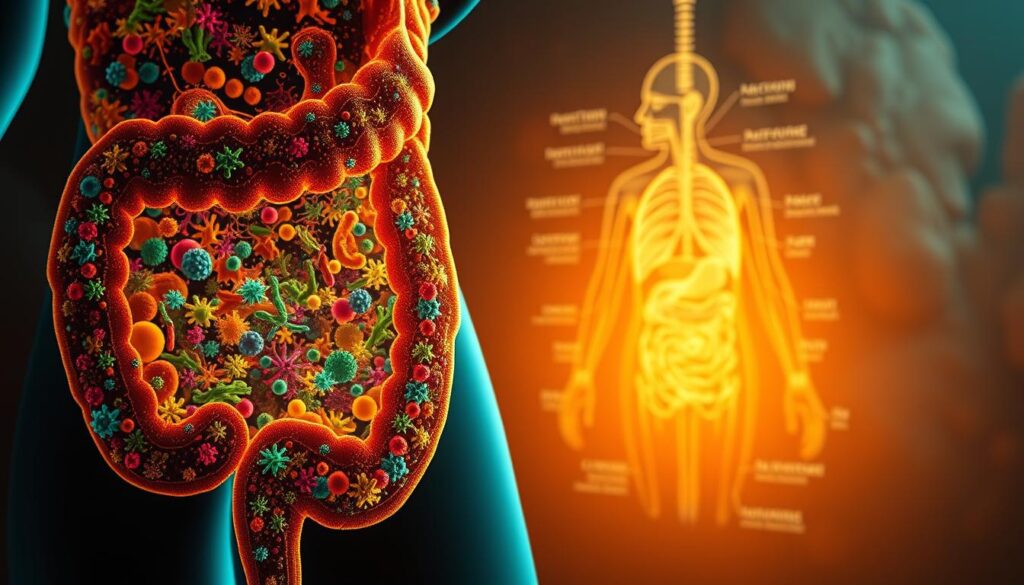
Banner Health research shows imbalanced microbiomes raise risks for obesity, inflammatory bowel disease (IBD), and autoimmune disorders. ZOE’s study identified over 50 microbiome biomarkers tied to metabolic health, linking Mediterranean diets to higher “good” bacteria levels.
When harmful bacteria outnumber beneficial ones—a condition called dysbiosis—it may trigger leaky gut syndrome. This lets toxins enter the bloodstream, causing systemic inflammation. A 2021 Cell study found that sugar disrupts immune-gut communication, worsening the imbalance.
- Immunity: 70% of immune cells reside in the gut.
- Mental health: Gut bacteria produce 90% of serotonin.
- Disease prevention: Balanced microbiomes lower diabetes and heart disease risks.
Your microbiome is a powerhouse for overall health. Nurturing it with the right foods and habits can transform how you feel daily.
10 Simple Ways to Boost Your Gut Bacteria Naturally
The key to a thriving microbiome lies in what’s on your plate. Research shows that diet shapes your gut microbiota more than any other factor. Start with these two science-backed strategies.
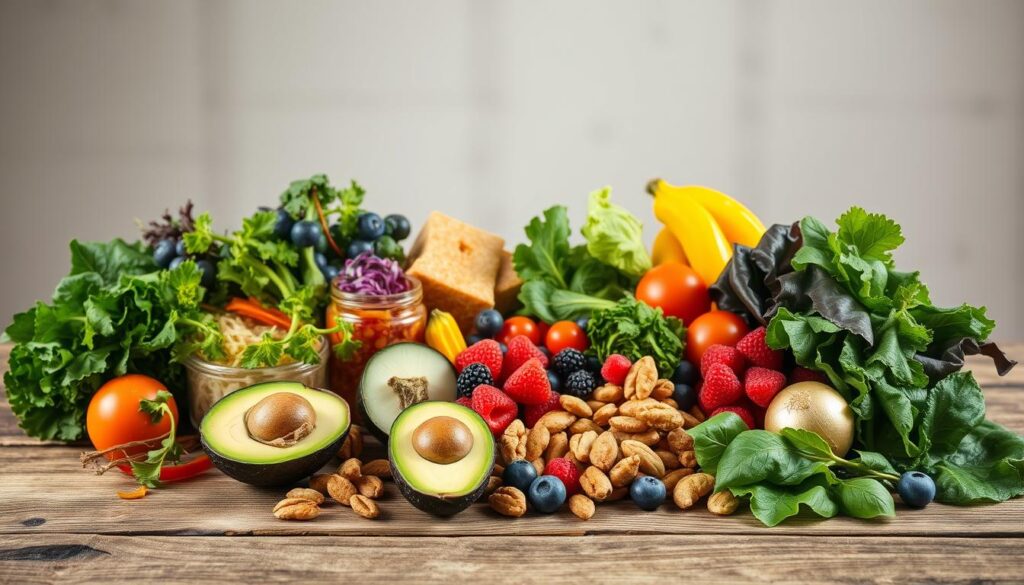
Eat a Rainbow of Plant-Based Foods
Dr. Will Bulsiewicz recommends eating 30+ plant types weekly. Variety feeds different bacterial strains, boosting microbial diversity. Examples include:
- Leafy greens (spinach, kale)
- Nuts and seeds (almonds, chia)
- Legumes (lentils, chickpeas)
Polyphenol-rich foods like blueberries, pomegranate, and dark chocolate act as fuel for beneficial bacteria. A Mediterranean diet, rich in these plants, is linked to 15% higher microbial diversity.
Prioritize Fiber-Rich Foods
Fiber ferments into short-chain fatty acids (SCFAs), which reduce inflammation. ZOE’s research found high-fiber eaters have 20% more Bifidobacteria. Great sources include:
- Whole grains (oats, quinoa)
- Root vegetables (sweet potatoes, carrots)
- Apples and bananas
Tip: Increase fiber slowly to avoid bloating. Add 5 grams daily until you reach 25–30 grams.
Incorporate Fermented Foods into Your Diet
Ancient traditions got it right—fermentation fuels a healthy microbiome. Foods like kimchi, kefir, and miso contain live microbes called probiotics. These beneficial bacteria crowd out harmful strains, improving digestion and immunity.
A 2020 mSystems study found kombucha drinkers had 15% higher Lactobacillus levels. This strain supports nutrient absorption and reduces inflammation. For similar benefits, opt for unpasteurized options—heat kills probiotics. Check labels for “live active cultures.”
Pair fermented foods with prebiotics for synergy. Try sauerkraut with onions or yogurt with bananas. Prebiotics feed probiotics, amplifying their effects.
Avoid sugary versions like flavored yogurts. Added sugars feed harmful bacteria, undermining the benefits. Stick to plain, unsweetened varieties for maximum impact.
Limit Sugar and Processed Foods
Sugar and processed foods silently sabotage your gut microbiota. Refined sugars feed harmful pathogens like Clostridium difficile, which can overwhelm beneficial strains. A 2022 Cell study found high-sugar diets slash Bacteroidetes—a key “good” bacteria group—by 40%.
Artificial sweeteners aren’t safer. Aspartame, common in diet sodas, reduced Lactobacillus in a 2014 PLOS One study. This imbalance raises the risk of bloating and poor nutrient absorption.
Swap soda for infused water (try cucumber-mint) to curb cravings. ZOE’s research shows avoiding processed foods for two weeks boosted “good” bacteria by 25%.
Ultra-processed snacks trigger inflammation by altering microbial diversity. Choose whole foods like nuts or berries instead. Your gut will thank you.
Stay Hydrated for a Healthy Gut
Water isn’t just for quenching thirst—it fuels your digestive tract. Proper hydration helps produce mucus lining your intestines, shielding them from harmful pathogens. Without enough water, this protective barrier weakens, raising infection risks.
Aim to drink half your body weight in ounces daily. For example, if you weigh 150 lbs, target 75 oz of water. A 2022 study found high water intake reduced Campylobacter (a common gut pathogen) by 30%.
Herbal teas like ginger or peppermint add anti-inflammatory benefits. They soothe the gut while keeping you hydrated. Avoid sugary drinks—they disrupt microbial balance.
- Dehydration leads to constipation, trapping harmful bacteria.
- Electrolyte-rich coconut water supports hydration and diversity.
- Infuse water with lemon or cucumber for flavor without additives.
Even mild dehydration slows digestion, letting toxins linger. Keep a water bottle handy to maintain steady hydration and a thriving microbiome.
Manage Stress to Support Gut Health
Your gut and brain are in constant conversation—stress can disrupt this vital dialogue. The gut-brain axis links emotional strain to microbial balance, with cortisol harming beneficial bacteria like Lactobacillus.
Chronic stress raises gut permeability, letting toxins trigger inflammation. A 2018 Frontiers in Microbiology study found yoga practitioners had 18% more beneficial microbes. Here’s how to counteract stress:
| Technique | Impact on Gut | Frequency |
|---|---|---|
| 10-minute meditation | Reduces Enterobacteriaceae | Daily |
| Ashwagandha (adaptogen) | Lowers cortisol, strengthens gut lining | 3–4x weekly |
| Journaling | Decreases bloating by 67% (Banner Health) | 5x weekly |
Adaptogens like ashwagandha calm stress responses while protecting the gut. For mental health, try journaling—it’s clinically shown to ease digestive discomfort.
Small habits add up. Even brief mindfulness sessions can restore microbial harmony. Your gut thrives when stress is in check.
Exercise Regularly for Microbial Diversity
Movement isn’t just for fitness—it reshapes your microbiome. Low-intensity workouts, like walking or yoga, increase Faecalibacterium prausnitzii, a bacterium that fights inflammation. This strain produces butyrate, a fatty acid that strengthens your gut lining.
Aim for 150 minutes of moderate activity weekly. Brisk walking, cycling, or swimming boosts microbial diversity. A 2019 study found runners had 30% more Akkermansia muciniphila, a bacterium linked to healthy weight.
“Regular exercise enriches gut bacteria linked to metabolic health and reduced inflammation.”
Balance is key. Overtraining spikes cortisol, harming your gut lining. Listen to your body—rest days are essential.
- Post-workout meals: Pair protein with fiber (e.g., salmon + quinoa).
- Hydrate: Water aids digestion and microbial balance.
- Variety matters: Mix cardio, strength, and flexibility training.
Small steps add up. A 20-minute walk daily can shift your microbiome toward better health.
Get Enough Sleep to Nourish Your Microbiome
Quality sleep does more than recharge your energy—it fuels your microbiome. Poor rest reduces microbial diversity and spikes inflammation, per a 2019 PLOS One study. Skimping on shut-eye slashes beneficial Coprococcus by 22%, weakening your gut’s defenses.
Your gut makes 70% of serotonin, the precursor to melatonin. Disrupted sleep throws this cycle off balance. Aim for 7–9 hours nightly in a 65°F room with blackout curtains. Darkness boosts melatonin, supporting both sleep and microbial repair.
| Sleep Tip | Gut Benefit | Frequency |
|---|---|---|
| Magnesium-rich snack (almonds, bananas) | Improves sleep quality, feeds Lactobacillus | Nightly |
| 12-hour overnight fast | Supports microbial repair | Daily |
| Cool, dark bedroom | Enhances melatonin production | Every night |
Avoid late-night eating. Fasting for 12+ hours lets your gut reset. Late meals disrupt circadian rhythms, harming microbial balance.
Small tweaks yield big results. Prioritize sleep—your microbiome thrives on consistency.
Consider Prebiotics and Probiotics
Probiotics get the spotlight, but prebiotics are the unsung heroes of gut health. While probiotics introduce live bacteria, prebiotics—a type of fiber—feed the microbes you already have. Both are essential for a thriving gut microbiota.
Top prebiotic foods include garlic, oats, apples (rich in pectin), and flaxseeds. These contain galactooligosaccharides, compounds that boost Bifidobacteria by 20%, per a 2021 study. Pair them with probiotics like yogurt or kefir for synergy.
After antibiotics, soil-based strains like Saccharomyces boulardii help restore balance. But beware: 60% of commercial probiotics lack clinically proven strains. Look for third-party tested brands like Seed or Culturelle.
“Personalized probiotic regimens improved gut health scores by 35% in ZOE’s trials.”
Not all fibers act as prebiotics. Focus on resistant starches (cooled potatoes) and polyphenols (berries) for maximum microbial fuel. Your gut thrives when fed strategically.
Avoid Unnecessary Antibiotics
Antibiotics can be lifesavers, but they come with hidden costs for your microbiome. Broad-spectrum versions wipe out 90% of gut bacteria—beneficial and harmful alike. This collateral damage reduces microbial diversity for up to two years.
Ask your doctor about narrow-spectrum options like penicillin for strep throat. Targeted treatments minimize disruption to your gut’s ecosystem.
After antibiotics, prioritize recovery:
- Probiotics: Take strains like Lactobacillus rhamnosus for 8 weeks.
- Fermented foods: Sauerkraut and kefir replenish good bacteria.
- Fiber: Feed surviving microbes with oats and flaxseeds.
A 2016 Genome Medicine study linked early antibiotic use to higher obesity risk. Children given antibiotics before age 2 had less diverse gut bacteria later in life.
Practice antibiotic stewardship. Reserve these drugs for critical needs to protect your long-term health. Your microbiome thrives when treated with care.
Conclusion
Small, consistent changes can transform your gut health over time. Focus on variety—30+ plants weekly, hydration, and stress management. Even occasional treats fit if most meals support microbial balance.
ZOE’s at-home test analyzes 50+ microbial strains, offering personalized food recommendations. Research shows diverse microbiomes may add 5–7 healthy years to your life.
Start with one habit, like adding kimchi daily or swapping soda for herbal tea. Track how you feel. Your gut thrives on gradual, mindful adjustments.
Ready to improve gut function? Take the first step today. Every choice fuels the trillions of bacteria working for your well-being.
